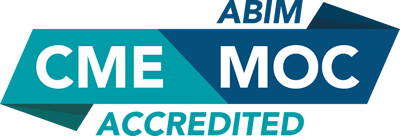
COURSE CREDITS & HOURS
AMA PRA Category 1 Credits™14 ACPE Credits
14.0 (part II) MOC points in medical knowledge in the American Board of Internal Medicine's (ABIM) Maintenance of Certification (MOC) program
4 Hours of Pharmacology for NPs
COURSE FEES
TARGET AUDIENCE
PROGRAM PURPOSE
- Dementia vs. Depression (diagnosis/management)
- Distinguish between dementia and depression.
- Identify the main causes of dementia and apply appropriate diagnostic and treatment strategies.
- Utilize the Alzheimer''s Association Pocketcard App for an updated easily accessible resource in primary care settings.
- Recognize and manage depression in older patients.
- Delirium (prevention, diagnosis, management)
- Apply the Confusion Assessment Method to diagnose delirium
- Identify and treat underlying causes of delirium
- Maximize use of non-pharmachologic approaches to delirium
- Critical Geriatric Perspectives: Frailty,Debility, and the Importance of Functional Assessment
- Define debility and frailty.
- Identify the different functions included in Activities of Daily Living and Instrumental Activites of Daily Living.
- How to utilize the health care team to assist your patients maximize functional status.
- Geriatric Physical Assessment:What is Normal and What is Not
- Recognize the challenges to a quality geriatric physical examination.
- Distinguish between clinical signs of normal aging and pathological findings in physical examination through a photographic review.
- Successful Aging-How to Stay Sharp and Fit as the Birthdays fly by
- Discover top tips for keeping a sharp mind and body for yourself and your aging patients.
- Polypharmacy: More is not Better
- Recognize polypharmacy and prioritize treatment medications
- Select practical regimens for improved medication compliance.
- Employ geriatric prescribing prinicples such as "start low and go slow" to lessen adverse outcomes.
- Preventative Care for Older Patients: Get your shots and don't fall!
- Implement current adult immunization schedule for older patients
- Analyze the root cause of falls and implement appropriate preventative strategies.
- Common Childhood Infections: Diagnosis and Treatment
- Identify an approach to evaluate and manage infants/children with fever
- Describe bacterial and viral illnesses of the respiratory tree with a focus on epidemiology, diagnosis, and treatment.
- List the characteristic features and describe the clinical courses of common exanthems.
- Health Risk Assessment and Prevention in Childhood
- Use evidence-based recommendations and guidelines to establish standardized procedures, including standardized protocols to screen child and adolescent patients
- Evaluate current clinical practices for alignment with updated evidence-based clinical preventive guidelines from the AAP and USPSTF.
- Develop a strategy to facilitate the adoption of evidence-based clinical practice guidelines.
- Adolescent Immunizations
- Identify available vaccine administration strategies and resources, available patient education resources, vaccine alert systems, and current immunization schedules.
- Use evidence-based recommendations and guidelines to establish standardized vaccine administration procedures, including standardized protocols to screen for immunizations during patient encounters.
- Counsel patients, and parents of children, using available patient education resources and motivational interviewing about vaccine safety and efficacy.
- Participate in available childhood immunization programs, and administer using a standardized process.
- HPV: Prevention and Management
- Discuss the role of HPV in cancer
- Review the available strategies for HPV prevention
- Apply USPSTF recommendations on screening for cervical dysplasia during routine office visits.
- Use evidence-based recommendations to evaluate women who have abnormal Pap test results to determine appropriate treatment or referral
- Contraception: Beyond Condoms, Pills, and Sterilization
- Describe principles of patient selection regarding contraceptives
- Discuss the indications/contraindications for various contraceptive methods
- Appraise recommendations for use of long-acting reversible contraceptives
- State the options and indications regarding methods of emergency contraception
- Menopause - The Heat Goes On!
- Develop an approach to evaluate the patient experiencing vasomotor instability.
- Identify the options for treatment of the patient with vasomotor instability.
- Provide patient education on the potential risks and benefits of hormone replacement therapy (HRT).
- Breast Cancer: Prevention and Screening
- Discuss the epidemiology of breast cancer.
- Review factors in breast cancer prevention.
- Use an evidence-based approach to recommendations on screening for breast cancer.
- State the USPSTF recommendations on screening for breast cancer.










































